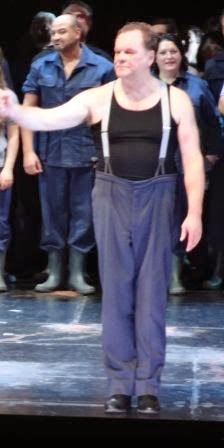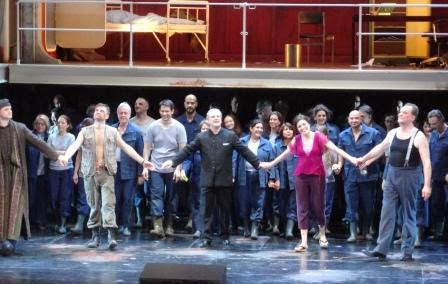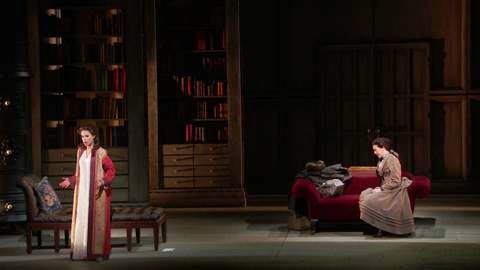(Review in English below)
(www.gulbenkian.pt)
A ópera em quatro actos Werther de Jules Massenet
(1842-1912) foi composta em 1887. O libreto é de Édouard Blau, Paul Milliet
e Georges Hartmann e baseia-se no
romance homónimo do escritor alemão do período romântico Johann Wolfgang von Goethe.
(www.wikipedia.com)
A obra de Goethe é um dos expoentes máximos do romantismo alemão. O texto é
riquíssimo na abordagem que faz da natureza humana intimista; da sua alegria e
tristeza; da paixão, do amor e do ódio; da esperança, da fé, do querer e do
desespero que, por vezes, resvala para a doença mental. É o ser humano nas suas
dimensões mais interiores, na sua relação consigo e com o outro próximo e na procura da ausência de solidão.
(www.wikipedia.com)
É disso que trata a ópera de Massenet. Como ópera do período
romântico, e não fossem os compositores franceses os que talvez mais bem tenham exploraram essa corrente, é daquelas que tem sempre os sentimentos à flor da pele e em que a
música e o texto se fundem num turbilhão arrebatado de emoções.
A adaptação do texto é de uma qualidade
exemplar, não só pela forma como relata a história, como pela própria beleza
poética, uma vez que cada frase se adapta na perfeição ao canto e às melodias,
permitindo explorar vários registos, do mais lírico ao mais dramático.
Poderão ler uma sinopse aqui.
(internet)
Inicialmente, no primeiro acto cria-se o cenário propício a uma paixão arrebatada.
Werther sente em plenitude os esplendores da natureza, o que fica bem patente
na ária “Je ne sais si je veille ou si je
rêve enconre!” que termina com um “et
toi, soleil, veins m’inonder de tes rayons!”. Entretanto, surge Charlotte
por quem se apaixona instantaneamente. Ao declarar-lhe o seu amor, surge, de
imediato, um presságio trágico (“Je
donnerais ma vie pour garder à jamais ces yeux”). Imediatamente a seguir, o
pai de Charlotte anuncia o regresso do seu prometido Albert. Charlotte, já
esquecida do que prometera à sua mãe, cai em si e Werther percebe que não terá
Charlotte: “A ce serment... restez
fidèle! Moi... j’en mourrai! Charlotte! Un autre! Son époux!”. Termina o
1.º acto.
(internet)
No segundo
acto, Werther surge desesperado. Charlotte e Albert casaram e, assim, todo
o seu ser chora (“tout mon être en
pleure!”). Albert sugere-lhe que procure a felicidade, por exemplo, na alegria de Sophie.
Mas Werther continua apaixonado por Charlotte, embora, por momentos, se tente, junto de Albert, convencer do contrário. Ao sentir que mentiu, crê dever afastar-se, mas não consegue (“Partir? Non! Je ne
veux que me rapprocher d’elle”). É Charlotte quem o afasta: o dever não
cede ao desejo. E ele parte até ao Natal entre questões sobre a morte e Deus
(“Et si la force m’abandonne... Ah! C’est
moi pour toujours qui me reposerai!” e “Père,
que je connais pas, en qui pourtant j’ai foi, parle à mon coeur, appelle-moi!
Appelle moi! Appelle-moi!”). Albert apercebe-se, num claro contraste com o final
do primeiro acto, que Werther ainda ama Charlotte (“Il l’aime!”).
(internet)
O terceiro
acto começa com a leitura das cartas de Werther. Lê-se nelas a melancolia e
o desejo do jovem, aos quais Charlotte não consegue ficar indiferente (“Ces lettres! Ah! Je les relis sans cesse...”).
Werther está deprimido e só (“Je vous
écris de ma petite chambre: au ciel gris et lourd de Décembre, pèse sur moi
comme un linceul, et je suis seul! Seul! Toujours seul!”), antevendo-se o
desejo de suicídio. Mais tarde, Werther regressa ante uma Charlotte dividida
entre o amor e o desejo e o dever conjugal de fidelidade. Mas a sua moral é
rígida e não cede. Werther lê os versos de Ossian que espelham a sua alma: soa
a ária “Pourquoi me réveiller” onde
se diz “Ils ne trouveront plus que deuil
et que misère!”. Nisto, perdido, declara-se de novo, enquanto Charlotte
pede a Deus que a proteja, pois teme ceder à tentação. Werther beija-a e ela
diz-lhe, num Ah! agónico, que ele não
mais a verá (“Vous ne me verrez plus!”).
O terceiro acto acaba com uma declaração fúnebre, desesperada e de morte,
naqueles que são, provavelmente, os mais trágicos versos da ópera: “Prends le deuil, ô nature! Nature! Ton fils,
ton bien aimé, ton amant va mourrir! Emportant avec lui l’éternelle torture, ma
tombe peut s’ouvrir!”. Werther condena a sua própria natureza. Depois, é
Albert quem manda Charlotte, não sem que tal soe a castigo, entregar as suas próprias
armas ao mensageiro de Werther que lhas pedira. Esta, desesperada, entrega-as “Dieu! Tu ne voudras pas que j’arrive trop tard!”.
Será, pois, Charlotte quem, de alguma forma, fica responsabilizada por entregar
à morte o seu amado, morte essa que acontecerá com as armas do seu próprio
marido.

(internet)
No quarto
acto, na noite de Natal, Werther jaz no seu quarto, depois de ter dado um tiro
em si próprio. Chega Charlotte, ofegante, à sua procura. É tarde. Werther vai
morrer. Charlotte sente-se culpada e, com a mão de Werther na sua, acompanha a
sua agonia, entre declarações de amor mútuo que se fundem num beijo quente antes
do sopro de vida final do suicida. Lá fora, soam as vozes joviais das crianças
e de Sophie (“Noel! Noel! Noel!”, “Dieu permet d’être heureux!”). Cai o
pano.
(internet)
A nova produção de Werther para o MET esteve
a cargo do encenador Richard Eyre.
Esta ópera obriga a um cenário pequeno, intimista e doméstico, que se centre na
relação dual Werther-Charlotte e em que tudo o mais surja apenas como contexto.
Penso que o consegue.
No primeiro acto, Eyre começa por introduzir
a cena da morte da mãe de Charlotte com recurso a projecções de vídeo (por
exemplo, as árvores a encherem-se de corvos aquando do enterro) que
contextualiza a acção. Depois segue-se a transição para o 2.º acto com um
baile.
(internet)
Não é que nenhuma destas cenas estejam nas indicações cénicas, mas
permitem usar o prelúdio e o interlúdio como momentos narrativos, que, no meu
ver, acrescentam beleza e enriquecem a encenação. A direcção de actores, nestes
dois actos, pareceu-me, todavia, por vezes, demasiado impulsiva, tudo muito em de repentes... O cenário é também um
pouco amplo de mais e há uma ponte no centro do palco que não faz qualquer
sentido: não estabelece ligação entre nada e está lá apenas por estar. Não desempenha qualquer função na acção. Mais valia ter lá uma fonte ("cette source limpide").
Onde Eyre consegue estar sublime é a
partir do 3.º acto. A sala está extremamente bem montada e decorada (de acordo
com o libreto, embora provavelmente demasiado sumptuosa para uma casa rural) e
cria um ambiente doméstico e acolhedor. Mas é o 4.º acto que é arrebatador. Werther
surge no seu quarto: uma caixa acolhe o seu quarto, encolhe o cenário e avança sobre o palco. No
interlúdio, vê-se Werther desesperado com a ideia da morte. O suicídio está
prestes a consumar-se e Werther, de arma na mão, hesita. Ao pegar numa carta, ganha coragem e
dispara sobre o peito: cai no leito, a luz apaga-se e a parede surge tingida de
sangue, num pormenor extremamente bem conseguido do ponto de vista cénico. Aliás, toda
esta cena é carregada de um dramatismo trágico arrepiante. A encenação foi,
pois, um dos grandes atractivos da tarde. Podemos, sobretudo no final,
encontrar muitas semelhanças com a encenação de 2004 para a ROH/Ópera de Paris
de Benoît Jacquot, encenação essa,
que em minha opinião, nada deve à de Eyre. Aliás, gosto mais da do francês. Mas
são ambas excelentes.

(internet)
A direcção da Orquestra do MET esteve a cargo do maestro Alain Altinoglu. Esteve em excelente nível, com um bom tempo, a dar
peso à orquestra quando necessário e a respeitar os cantores. A forma como
explorou as diferentes colorações melódicas foi óptima. Interpretou muito bem
Massenet!
Jonathan
Summers (barítono) foi o pai
de Charlotte. Gostei da sua postura, embora não especialmente da voz, mas
cumpriu bem. Philip Cokorinos
(baixo) e Tony Stevenson (tenor)
fizeram o duo Johan e Schmidt: estiveram em bom plano vocal e cénico. O coro das crianças teve, igualmente, uma
excelente performance.
(internet)
Lisette
Oropesa (soprano) foi
Sophie. A sua voz é jovem, fresca e melodiosa, com projecção fácil. A figura
adequa-se ao papel de jovem irmã de Charlotte. Assumiu a postura naive que se espera e interpretou a
personagem com muita qualidade cénica e vocal. Pena que o seu francês não sejam
o mais perfeito, o que teria elevado a sua prestação a um patamar de
excelência.
(internet)
David
Bizic (barítono) foi Albert,
marido de Charlotte. Gostei da sua postura cénica e da sua voz. Teve um bom
desempenho, sem que, todavia, tenha deslumbrado.
(internet)
Sophie
Koch (meio-soprano) foi Charlotte. É um dos papéis que
marcam a sua carreira, pelo que lhe assentou na perfeição para a estreia, mais
do que merecida, no palco americano. A sua voz é excelente e interpreta
sublimemente a personagem Charlotte. Esteve em grande plano vocal no 3.º acto
na leitura das cartas e a sua interpretação cénica foi muito convincente. Penso
que será difícil, hoje em dia, encontrar melhor cantora/actriz para o papel!
(internet)
Deixo, propositadamente, para o fim, o tenor Jonas Kaufmann que interpretou Werther.
Não compreendo os críticos que se deleitam a criticar o seu tom baritonal.
Insistem nesta tecla, o que só poderei entender como inveja. É que as senhoras
têm uma predileção especial por Kaufmann… O seu Werther foi a todos os níveis
excepcional! Se no “Je ne sais si je
veille”, ária de entrada de extrema dificuldade, não esteve perfeito, mas a
partir daí foi imparável. Que dizer da forma como termina “Père, que je connais pas, en qui pourtant j’ai foi, parle à mon coeur,
appelle-moi! Appelle moi!”? O terceiro appelle-moi
foi incrivelmente bem interpretado. O seu “Pourquoi me reveiller” foi perfeito marcado por um longo aplauso. E o seu 4.º acto: foi
inigualável. Cenicamente é um actor de excelência: gesto, postura,
intensidade, mímica. Extremamente verosímil. Eyre comparou-o a Robert de Niro e
Al Pacino (talvez exagere um bocadinho...). E o canto é perfeito. Ninguém nos
dias de hoje, excepto Kaufmann, canta e interpreta daquela maneira. A forma
como diz, tão melodiosamente, “et d’une
douce larme, en son ombre tombée le mort”. A palavra larme dita por ele não me sai do ouvido. Enfim... Foi a
interpretação da tarde e que privilégio temos nós todos de ser contemporâneos
de Kaufmann! Não lhe tiro o chapéu apenas porque não uso…
Grande tarde de ópera!
----------
(Review in English)
Werther
by Jules Massenet (1842-1912) is an
opera in four acts composed in 1887. The libretto is by Édouard Blau, Paul Milliet
and Georges Hartmann and is based on
the homonymous novel by German writer of the romantic period Johann Wolfgang von Goethe.
Goethe's
work is one of the foremost exponents of German Romanticism. The text is rich
in intimate approach on human nature, with its joy and sorrow, passion, love
and hatred, hope and faith, desire and despair that sometimes slips into mental
illness. It is the human being in its most interior dimensions and their
relationship with himself and with the other, and about the demand of the
absence of loneliness.
That's what comes in
Massenet's opera. As an opera of the Romantic period, and the French composers were
those who best exploited this feeling, it is one that always has the extreme feelings
reaching us and the music and text merge into a heady whirlwind of emotions.
The adaptation of the text is
an exemplary quality, not only by the way tells the story, as the poetic beauty
of its own, since each phrase fits perfectly into the corner and melodies,
allowing to explore different registers, from the lyrical to more dramatic.
You can read a synopsis here.
The new production of Werther
for the MET was in charge of director Richard
Eyre. This opera requires a small, intimate, domestic setting, which
focuses on the dual relationship Werther and Charlotte in which everything else
arises only as context. I think Eyre did it.
In the first act, Eyre begins
by introducing the scene of death of the mother of Charlotte with the use of
video projections (e.g., the trees fill with ravens at the funeral) that
contextualizes the action. Then follows the transition to the 2nd
act with a dance. Note that none of the scenes are in the scenic indications,
but they allow you to use the prelude and interlude as narrative moments, which,
in my view, add beauty and enrich the scenario. The direction of actors, in these
two first acts, seemed to me, however, sometimes too impulsive, all very in
bursts... There is a bridge that I can’t understand why it is there: it does
not link anything. Where Eyre can be sublime is from the 3rd act till the end.
The room is extremely well fitted and decorated (according to the libretto, a
little bit too expensive, perhaps) and creates a domestic and welcoming
environment. But is 4th act that is stunning. Werther appears in his room: a
box welcomes his room and shrinks the scene. In the interlude, Werther sees
himself in despair at the idea of death. Suicide is about to be consumed and
Werther, gun in hand, hesitates. He then pick a letter, get courage and shoots himself
on his chest: he falls in bed dying, the light turns off and the wall comes
tinged with blood, a detail extremely well done in a scenic viewpoint. This
whole scene is loaded from a creepy tragic drama. The staging was therefore one
of the major attractions of the afternoon. I, especially towards the end, find
many similarities with the 2004 scenario for ROH/Paris Opera by Benoît Jacquot,
this scenario, which in my opinion, being as good as Eyre’s or even better. But
they both are excellent.
The direction of the MET Orchestra was in charge of
conductor Alain Altinoglu. He did an
excellent level conducting, with good tempo, giving weight to the orchestra
when needed and respecting singers. The way he explored the different melodic
coloration was great. Massenet played very well!
Jonathan Summers (baritone) was the father of Charlotte. I like his attitude, though not
especially his voice, but he went well. Phiilip
Cokorinos (bass) and Tony Stevenson
(tenor) were Johan and Schmidt duo: they were at a good vocal and scenic plane.
The choir of children also had an
excellent performance.
Lisette Oropesa (soprano) was Sophie. Her voice is young, fresh and melodious with easy
projection. The figure fits the role of younger sister of Charlotte. She took
the naive stance that is expected and played the character scenic and vocally
with quality. It is a pity her French is not the most perfect, which would have
elevated her performance to a standard of excellence.
David Bizic (baritone) was Albert, husband of Charlotte. I like his scenic attitude
and his voice. He performed well, without, however, dazzling.
Sophie Koch (mezzo-soprano) was Charlotte. It is one of the roles that mark her
career, so it sat perfectly for the well-deserved premiere at the American opera
stage. Her voice is great and she sublimely plays the role of Charlotte. She was
in great voice plan 3rd act, reading Werther’s letters and her
scenic interpretation was very convincing. I think it will be difficult, nowadays,
to find a better singer/actress for the role!
I leave purposely tenor Jonas Kaufmann to end. He played
Werther. I do not understand the critics who are always delighted criticizing his
baritonal tone. They insist on this topic, which I can only understand as envy.
The ladies have a special fondness for Kaufmann... His Werther was exceptional at
all levels! If the "Je ne sais si je
veille" entrance aria (of extreme difficulty) was not perfect, he was
unstoppable from there. What about the way he ends "Père,
que je connais pas, en qui pourtant j’ai foi, parle à mon coeur, appelle-moi!
Appelle moi!”? The third appelle-moi was incredibly well played.
His "Pourquoi me reveiller"
was perfect. And what about his 4th act? He has no parallel. Scenically he is
an actor par excellence: gesture, posture, strength, mime. He is extremely
true. Eyre compared him to Robert de Niro and Al Pacino (perhaps Eyre exaggerated
a little, but...). And the way he sung is perfect. Nobody these days, except
Kaufmann, sing and play that way. The way he says, so melodiously, “et
d’une douce larme, en son ombre tombée le mort”. The word larme said the way he did it not get out
of my ears. Anyway... It was the interpretation of the afternoon and we all
have the privilege of being Kaufmann contemporaries!
Great afternoon of opera!








































